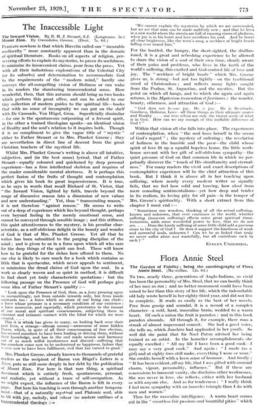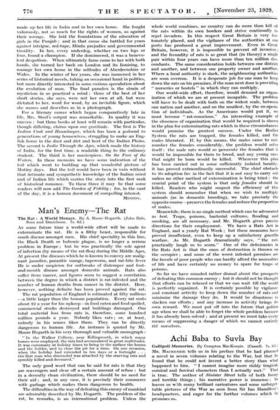Flora Annie Steel
The Garden of Fidelity ; being the autobiography of Flora Annie Steel. (Macmillan. 128. 6d.) To two, nearly three, generations of Anglo-Indians, so vivid has been the personality of Mrs. Steel, that we can hardly think of her race as run ; and no better monument could have been raised to her than this story of her life, which the indomitable old lady wrote herself in her eighty-third year, and did not live to complete. It reads as easily as the best of her novels. Free from gossip and scandal, it is a record of a complex character—a cold, hard, masculine brain, wedded to a warns heart. Of such a union the fruit is paradox ; and in this book paradox abounds. All through it, for example, there runs a streak of almost impersonal conceit. She had a good voice, she tells us, which Joachim had applauded in her youth. So well did she paint that Sir Noel Paton advised her being trained as an artist. In the homelier accomplishments she equally excelled : " All my life I have been a good cook—I may say a very good cook." And again : " I made (as a girl) and at eighty-two still make, everything I wore or wear." She credits herself with a keen sense of humour. And finally : " It has been evident, all my life, that I was gifted with unusual charm, vigour, personality, influence." But if these arc concessions to innocent vanity, she disclaims other weaknesses. She was never in love, she reflects, either with her husband or with anyone else. And as for tenderness : " I really think I feel more sympathy with an isosceles triangle than I do with men and women."
Thus far the masculine intelligence, A warm heart comes ontinthe " countless fair passions and bountiful pities which
made up her life in India and in her own home. She fought valorously, not so much for the rights of women, as against their wrongs. She laid the foundations of the education of girls in the Punjab ; and in that cause she battled for years against intrigue, red-tape, Hindu prejudice and governmental timidity. In her, every underdog, whether on two legs or four, found a champion. If she domineered, it was a benevo- lent despotism. When ultimately fame came to her with both hands, she turned her back on London and its lionizing, to manage her own home in the solitudes of Aberdeenshire or Wales. In the winter of her years, she was immersed in her series of historical novels, taking an occasional hand in politics, but more directly interested in some curious speculation about the evolution of man. The final paradox is the strain of mysticism in so practical a mind ; three of the best of her short stories, she says, were not her own at all, but were dictated to her, word for word, by an invisible figure, which she names and describes as in a photograph.
For a literary career which began comparatively late in life, Mrs. Steel's output was remarkable. In quality it was uneven ; but three books at least will remain with particular, though differing, claims upon our gratitude. The first is The Indian Cook and Housekeeper, which has been a godsend to generations of young housewives, struggling to make an Eng- lish home in the dust and dirt and heat of the Indian Plains. The second is India Through the Ages, which made the history of India, for the first time, a readable thing to the ordinary student. The third is her masterpiece. On the Face of the Waters. In these memoirs we have some indication of the toil which went to building up that wonderful picture of Mutiny days. But the toil would have been in vain without that intimate and sympathetic knowledge of the Indian mind and of Indian life which carries the story into the first rank of historical romance. To these three it may be that some readers will now add The Garden of Fidelity ; for, in the cant of the day, it is a human document of compelling interest.
MESTON.































































 Previous page
Previous page